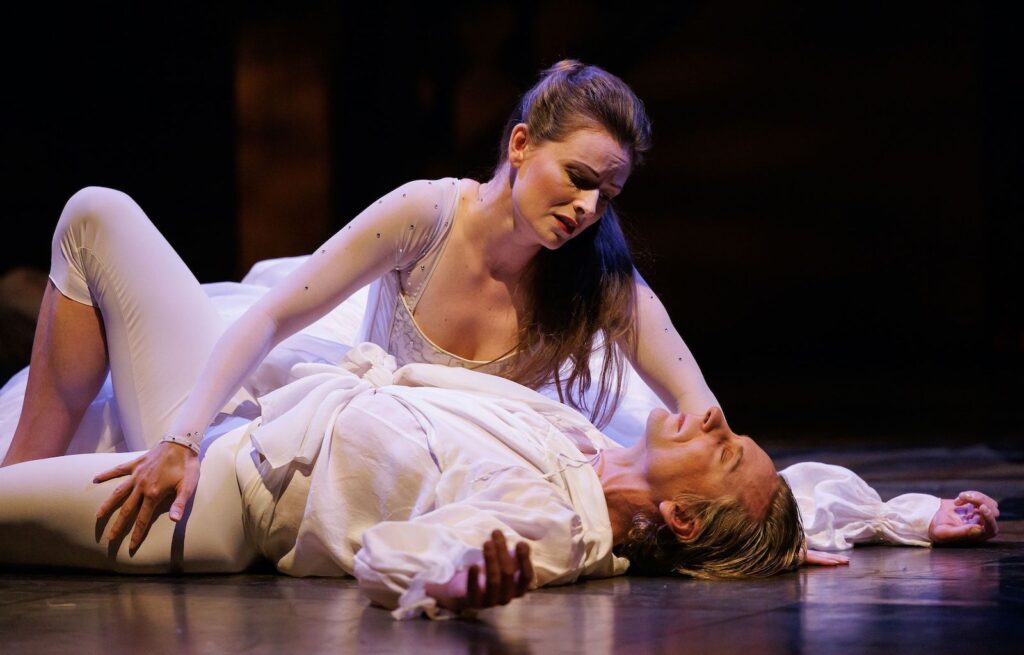All Is Love, Opera Atelier’s fluid, through-directed 90-minute conjunction of dance and opera currently on stage at Koerner Hall, shines long and bright in memory, a theatrical re-encounter made all the more arresting by virtue of its tumultuous history.
An unsuspecting victim of hostile happenstance, co-artistic directors Marshall Pynkoski and Jeannette Lajeunesse Zingg’s tender declaration of shared humanity, for all intents and purposes, fully emerges into the spotlight for the first time at the RCM’s premier showplace, an earlier identical iteration in 2022 notwithstanding. Accompanied by vicious late winter weather when first presented at the selfsame Bloor St. West venue, pandemic still raging, threatened by the sudden appearance of a belligerent 18-wheeler Convoy of Occupation, trapped in a midtown security lockdown, the mounting accumulation of fraught events rendered significantly less than sold-out attendance a virtual certainty — 250 ticket-goers in total by OA’s reported count.
Thankfully, Pynkoski and Lajeunesse Zingg were not to be deterred. All Is Love has returned.
This is not primarily an excursion into the unadorned heart and soul of classical music theatre, Baroque or otherwise. Story-telling, although present to a degree, is not sacrosanct here. All Is Love is more a celebration of scena, the intimate framework that forms the emotional compass point of any and all operatic expression, more an unfolding series of artistic correlatives than an expression of any formally defined narrative arc. Dramatic development subtly builds in successive waves of revelation, consistencies — or glaringly opposed disparities — of atmosphere and action loosely linking one musical selection to another.
Matthew Locke’s Curtain Tune from The Tempest, stirringly animated by Artists of Atelier Ballet segues to the calming, infinitely less surging strains of Purcell’s Music For a While, enchantingly sung by mezzo-soprano Danielle MacMillan.
Tenor Colin Ainsworth contributes a singularly captivating Plus j’observe ces lieux plucked from Lully’s epic Armide, a mystical landscape by set designer Gerard Gauci — one of many self-painted works employed as projected backdrops by Pynkoski — towering above the stage. Entranced, the knight Renaud falls into a deep spellbound sleep as a swirling, evanescent ballet encircles him. Wizardry is afoot. Sorcery commands the imagination.
Pynkoski and Lajeunesse Zingg consistently surprise. Singers dance, dancers act — expectations are sent spinning, characterization and emotion constantly evolving amid the steady pulse of comings and goings. Interconnectedness is everything here, as profound as it is mutable, love, a potent life force, uplifting, often contradictory, governing essentially every moment on view.
Launching the musical magic, soprano Measha Brueggergosman-Lee gives ample voice, by way of introduction, to the scope of the themed proceedings, singing a self-originated ballad, All Is Love, dedicated to Pynkoski and Lajeunesse Zingg. Deftly arranged by piano partner Christopher Bagan. 20th century art song — À Chloris by Reynaldo Hahn — gracefully merges with 17th century theatre piece — Purcell’s luscious Sweeter than roses. Returning later in the program to sing Nuit d’étoiles by Debussy, Brueggergosman-Lee positively sparkles, delivering a moody prelude of sorts to the centrepiece of the evening, a remounted performance of Scene 1 from the composer’s Pelléas and Mélisande.
A symbolist masterpiece first presented in 1902, Debussy’s tense, hyperbolic, supremely enigmatic fairytale forms something of an operatic riddle where nothing and everything is revealed, a source of some considerable fascination for Pynkoski, as he has readily admitted in the past. Ambiguity abounds. Reality is skewed. Appearing as Golaud, bass-baritone Douglas Williams blazes with physicality, soprano Meghan Lindsay as Mélisande, a vision of displaced reason, recitatives tremulous and poignant. A phantom corps of cryptic spirits, led by Eric César de Mello da Silva, frequently employed elsewhere as winged Cupid, here a watchful Amour in hiding, populates a dark wooded dreamscape.
Rewinding to a number of particularly notable earlier points in the program, singer actor MacMillan, in a volatile appearance as the dashing hero of Handel’s supernatural thriller, Alcina, a celebrated trouser role, sings an intensely affecting Mi lusingha il dolce affetto (“I am enchanted by tender feelings”).
Soprano Cynthia Akemi Smithers and fellow soprano Lindsay delight with an earthy, Two daughters of this Aged stream, from Purcell’s rollicking semi-opera, King Arthur.
Composer/violinist Edwin Huizinga, joined by choreographer/dancer Tyler Gledhill electrify, reunited for a thrilling performance of the pair’s stunningly impassioned dance/drama, Inception, first presented by Opera Atelier in 2018, reprised countless times thereafter, as compelling and hypercharged as ever.
Revisiting Hahn for a second time, baritone Jesse Blumberg solos, singing a lovingly lyrical L’heure exquise, imparting an air of striking tenderness to the inventive modernist’s gentle, unadorned mélodie.
A superb 13 player orchestra drawn from the ranks of Tafelmusik, led with great sensitivity by conductor David Fallis, plays with unstinting brilliance, instrumental colours gleaming, continuo lustrous and unalloyed. The Debussy is exceptionally well-handled, a remarkable achievement for a period ensemble more accustomed to the skipping tempi and gilded harmonies of the Baroque than the darker minimalism of the early 20th century. A bravura performance of unbounded skill.
All Is Love is timeless. The ringing resonance, the preciousness, the rippling radiance of this dazzling, altogether original concert drama lives again.


